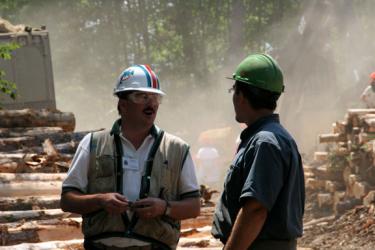Choosing a Consulting Forester
The most important thing to remember when hiring any service professional is that they will be working for you. So make sure to choose someone that listens to you, understands what you need, and with whom you can build a good working relationship. Many client-forester relationships that start with a single project become long-term relationships where the forester works to ensure the health of the woods for more than one generation of owners.
Second, it is important to check on a forester's qualifications.
- Ask a potential consultant if they are registered. A registered forester is a person who is qualified to engage in the practice of forestry and holds a current valid license issued by a qualifying agency. Unfortunately, forester registration statutes vary by state, and aren’t always mandatory. Sixteen states sponsor some kind of credentialing process for foresters (for details see below). Often you can file a complaint about poor service through the same government agency that implements the registration.
Credentialing Consulting Foresters
Alabama, California, Connecticut, Maine, Maryland, Massachusetts, and New Hampshire have licensing statutes, which means that foresters have to meet certain criteria before they can practice. Arkansas, Georgia, Mississippi, North Carolina, and South Carolina have mandatory registration statutes, and Michigan, New Jersey, Oklahoma, and West Virginia have voluntary registration statutes.
Additionally, the Society of American Foresters certifies foresters who have at least a bachelor's degree from one of the 50 forestry programs accredited by the Society or from a forestry program that, though not accredited by the Society, is substantially equivalent. In addition, the candidate must have 5 years of qualifying professional experience, pass an examination and maintain their certification with continuing education credits.
- Next, enquire after the consultant's educational qualifications. Usually, consulting foresters have at least a bachelor's degree in forestry, biology, natural resource management, environmental sciences, or a related discipline. (In rare cases, foresters that started out in the Federal government may not have a Bachelor's degree.) Several foresters also have Master's degrees, which might be an attractive plus if relevant to the project you have in mind.
- Also check if the consulting forester is a member of a professional association such as the Society of American Foresters (SAF), the Association of Consulting Foresters (ACF) or the Professional Forest Guild. This is not necessary, but membership indicates that a forester takes his or her profession seriously and tries to stay well-networked and up to date with new
- If the Consulting Forester will be implementing a project in your woods, ensure that they and their contractor has the necessary insurance. At a minimum, contractors should have automotive and commercial general liability, and they should comply with workers’ compensation laws. Consultants should carry Errors and Omissions (professional liability) insurance. Hiring a contractor and/or subcontractor without insurance could mean you will be held personally liable for an accident on your property
Finally, the best way to predict how a professional will work for you is to see how they've worked for others like you. So make sure you ask a forester for a few references, preferably where they've worked with similar landowners on similar projects. Follow up with those landowners to see how satisfied they are with the forester's work and whether they plan to use him or her again for future projects.
Find out more
For more on how to choose a forestry consultant, see this article prepared by the Colorado State Forest Service.
How can I get more tips?
It’s simple! Enter your email below.

